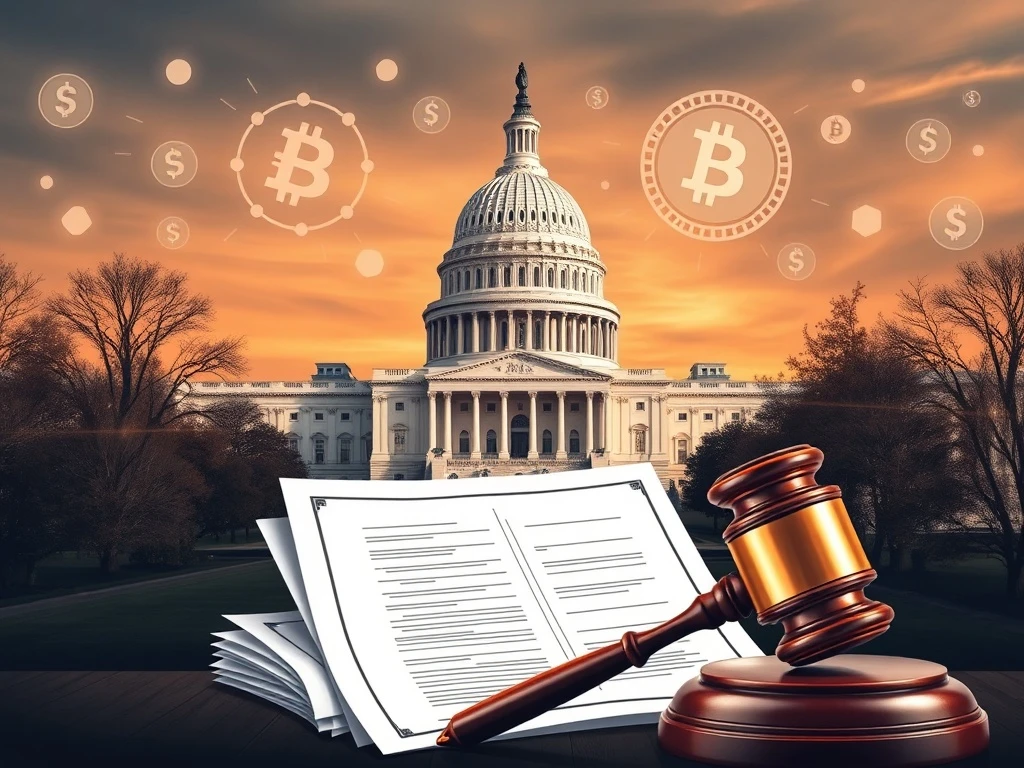Crypto Week: A Pivotal Moment for Digital Assets in US Congress

Get ready, crypto enthusiasts! Washington D.C. is buzzing as ‘Crypto Week’ approaches, a period lawmakers have designated to tackle critical legislation impacting the digital asset landscape. This isn’t just another week; it’s a potential turning point for how cryptocurrencies are regulated and integrated into the U.S. financial system.
What is ‘Crypto Week’ and Why Does it Matter?
Dubbed ‘Crypto Week’ by lawmakers, this concentrated effort by the US Congress aims to advance three key pieces of legislation for the blockchain industry. The goal is to bring much-needed clarity and foster growth within the digital asset sector. Major crypto exchanges, like Coinbase, have amplified their lobbying efforts, signaling the high stakes involved. This week could set precedents for the future of crypto in America.
The US House Financial Services Committee announced ‘Crypto Week’ would commence on July 14, focusing on these three significant crypto bills:
| Bill Name | Primary Focus | Key Sponsor | Current Status |
|---|---|---|---|
| Digital Asset Market Clarity Act | Defines SEC/CFTC roles for digital assets | Rep. French Hill | Introduced in late June |
| GENIUS Act (Stablecoins) | Establishes stablecoin regulation framework | Bipartisan Group | Passed Senate, now in House |
| Anti-CBDC Surveillance State Act | Prevents Federal Reserve from issuing a CBDC | Rep. Tom Emmer | Under deliberation |
The CLARITY Act: Redefining Digital Asset Regulation
The Digital Asset Market Clarity Act (CLARITY Act), introduced by Republican Representative French Hill, seeks to provide a definitive framework for digital assets. A primary objective is to clarify the roles of the Securities and Exchange Commission (SEC) and the Commodity Futures Trading Commission (CFTC). For years, the crypto industry has argued that the existing Howey test is outdated for digital assets.
Key provisions of the CLARITY Act include:
- Exemption from Securities Act: Offers an exemption from the 1933 Securities Act’s registration for investment contracts involving digital commodities on ‘mature’ blockchains.
- ‘Mature’ Blockchain Definition: Defines ‘mature’ blockchains as networks where the digital commodity is primarily derived from the blockchain’s use, has no user restrictions, and limits certain holders to less than 20% ownership.
- CFTC Jurisdiction: Grants the CFTC ‘exclusive regulatory jurisdiction’ over crypto transactions.
- Exchange Requirements: Requires crypto exchanges and brokers to register with the CFTC, subjecting them to record-keeping, reporting, and antitrust considerations.
However, the CLARITY Act faces opposition. Critics, including Americans for Financial Reform (AFR) and Senator Elizabeth Warren, view it as a ‘crypto crash grab’ designed to help companies bypass SEC regulation. Polymarket currently gives the CLARITY Act a 52% chance of being signed into law by 2025, reflecting divided opinions.
GENIUS Act: Pioneering Stablecoin Regulation
Perhaps the most widely discussed bill, the Guiding and Establishing National Innovation for US Stablecoins Act (GENIUS Act), aims to establish a robust stablecoin regulation framework. Introduced by a bipartisan group, this bill has already passed the Senate with bipartisan support and is now with the House.
The GENIUS Act proposes:
- Issuer Definition: Defines entities permitted to issue stablecoins.
- 1:1 Backing: Mandates that issuers maintain reserves backing stablecoins on a one-to-one basis using U.S. currency or other liquid assets.
- BSA Compliance: Subjects stablecoin issuers to the Bank Secrecy Act.
- Insolvency Provisions: Sets clear guidelines for stablecoin issuer insolvency events.
This stablecoin regulation is seen by proponents as a way to strengthen the dollar’s global power and provide a ‘rulebook’ for the burgeoning digital financial system. Despite some lingering concerns about its impact on dollar dominance and treasury markets, betting markets are optimistic, with Polymarket showing a 92% chance of the GENIUS Act passing this year.
The Anti-CBDC Surveillance State Act: Protecting Privacy
Republican Representative Tom Emmer introduced the Anti-CBDC Surveillance State Act, a bill focused on preventing the Federal Reserve from issuing a central bank digital currency (CBDC). Driven by concerns over citizen privacy, this act aims to:
- Forbid Fed CBDC: Prohibit the Federal Reserve from issuing a CBDC, either directly or through a third party.
- Limit Monetary Policy Influence: Prevent the Fed from using a CBDC to influence monetary policy.
- Congressional Authority: Grant Congress the sole authority to issue a digital dollar.
This bill has garnered support from organizations like the Blockchain Association and the Digital Chamber of Commerce, alongside various banking lobbies. A hearing on related tax policy aspects is scheduled, indicating active deliberation on this significant crypto bill.
Will These Crypto Bills Pass? The Road Ahead for US Congress
The ambition to pass three major crypto bills in a single ‘Crypto Week’ is a significant undertaking, given the often slow pace of lawmaking in Washington. While major crypto companies like Coinbase continue their lobbying efforts—evidenced by the ‘Stand With Crypto’ grassroots campaign urging support for the CLARITY Act—the path forward is not without hurdles.
Opposition to bills like the CLARITY Act highlights the deep divisions regarding crypto regulation. However, the bipartisan support for the GENIUS Act suggests that common ground can be found on certain aspects of digital asset policy. The focus on crypto by lawmakers is clear, even if not all bills pass this week. This legislative push underscores a growing recognition of digital assets’ importance in the financial landscape and the urgent need for a clear regulatory framework from the US Congress.
As ‘Crypto Week’ unfolds, the spotlight is firmly on Washington D.C. and its approach to digital assets. Whether all three proposed crypto bills cross the finish line or not, the legislative momentum is undeniable. This period marks a crucial chapter in the journey toward comprehensive and effective crypto regulation in the United States, shaping the future for innovators, investors, and everyday users alike. The outcome of these debates will undoubtedly resonate across the global crypto ecosystem.







